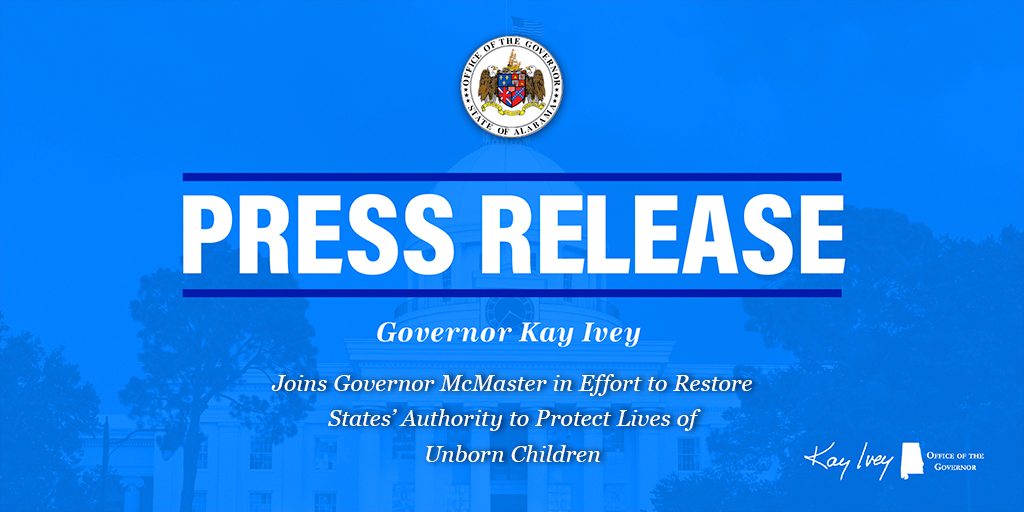Governor Ivey Joins Governor McMaster in Effort to Restore States’ Authority to Protect Lives of Unborn Children

MONTGOMERY – Governor Kay Ivey has signed on to an amicus brief, led by South Carolina Governor Henry McMaster, urging the Supreme Court to overturn Roe v. Wade and restore the authority of states to protect the lives of unborn children.
Governor McMaster today filed an amicus brief, joined by Governor Ivey and 10 other governors, in Dobbs v. Jackson Women’s Health Organization, urging the Supreme Court to reconsider and correct its previous decisions in Roe v. Wade and Planned Parenthood of Southeast Pennsylvania v. Casey.
“Alabama will continue to fight for life so that every unborn child is protected. We must stand strong for those babies who do not have a voice, and I assure my fellow Alabamians that we will continue this fight until they are protected once and for all,” said Governor Ivey. “We will not rest until Roe v. Wade is overturned.”
The following governors joined Governor McMaster’s brief, along with Governor Ivey: Governor Douglas A. Ducey of Arizona, Governor Asa Hutchinson of Arkansas, Governor Ron DeSantis of Florida, Governor Brian K. Kemp of Georgia, Governor Brad Little of Idaho, Governor Kim Reynolds of Iowa, Governor Michael L. Parson of Missouri, Governor Greg Gianforte of Montana, Governor J. Kevin Stitt of Oklahoma, and Governor Greg Abbott of Texas.
Background:
- In 2018, Mississippi’s only abortion clinic, Jackson Women’s Health Organization, and its medical director filed a lawsuit against Mississippi’s state health officer and others challenging the legality of the state’s recently enacted Gestational Age Act, which prohibits abortion after 15 weeks’ gestation, with exceptions for medical emergency or severe fetal abnormality.
- The U.S. District Court for the Southern District of Mississippi entered a temporary restraining order blocking the Act and later granted summary judgment in favor of the plaintiffs and permanently enjoined the Act.
- The U.S. Court of Appeals for the Fifth Circuit affirmed the district court’s ruling, reasoning that in light of the Supreme Court’s decision in Casey “no state interest can justify a pre-viability abortion ban,” that 15 weeks’ gestation is before viability, and that by prohibiting abortion after 15 weeks’ gestation the Act “undisputedly prevents the abortions of some non-viable fetuses.” The Fifth Circuit rejected Mississippi’s argument that the district court should have weighed the state’s interests in assessing the Act’s validity, concluding instead that because the Act “is a prohibition on pre-viability abortion,” it is unconstitutional under Supreme Court precedent. Judge Ho, who concurred in the Fifth Circuit’s judgment, noted that although “[n]othing in the text or original understanding of the Constitution establishes a right to an abortion,” he believed that “[a] good faith reading” of Supreme Court precedent required affirming the district court’s decision.
- On May 17, 2021, the U.S. Supreme Court agreed to hear Mississippi’s appeal and consider the following question: “Whether all pre-viability prohibitions on elective abortions are unconstitutional.”
The Supreme Court is expected to hear oral arguments in Dobbs this fall and issue a decision in the case by next spring or early summer.
The full brief is available here.
###
Provided by the Office of the Governor of Alabama | governor.alabama.gov

